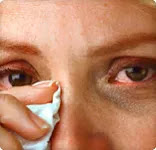If your toes are always cold, one reason could be poor blood flow -- a circulatory problem sometimes linked to smoking, high blood pressure, or heart disease. The nerve damage of uncontrolled diabetes can also make your feet feel cold to you. Other possible causes include hypothyroidism and anemia. A doctor can look for any underlying problems -- or let you know that you simply have cold feet.
Friday, December 2, 2016
What Your Feet Say About Your Health
If your toes are always cold, one reason could be poor blood flow -- a circulatory problem sometimes linked to smoking, high blood pressure, or heart disease. The nerve damage of uncontrolled diabetes can also make your feet feel cold to you. Other possible causes include hypothyroidism and anemia. A doctor can look for any underlying problems -- or let you know that you simply have cold feet.
Sleep During the Day May Throw Genes Into Disarray
-- Sleeping during the day -- a necessity for jet-lagged travelers and those who work overnight shifts -- disrupts the rhythms of about one-third of your genes, a new study suggests.
What's more, shifted sleep appears to disrupt gene activity even more than not getting enough sleep, according to the research.
For the new study, which was published in this week's issue of the journal Proceedings of the National Academy of Sciences, British researchers put 22 healthy, young volunteers in a dimly lit sleep lab for three days.
Sleep Disorders
What Are Sleep Disorders?
What Eye Problems Look Like
Warning Signs of Eye Trouble
Tips for Exercise, Diet and Stress Reduction
Tips for Recovering From Depression
If you've had depression, you know how hopeless you can feel. It's important to get professional treatment. But there are things you can do to ease symptoms of depression. Exercise, changing your diet, and even playing with a pet can improve your mood. Click to the next slide to see how you can start regaining control of your life.
Spring Allergies

Although there is no magical cure for spring allergies, there are a number of ways to combat them, from medication to household habits.
What causes spring allergies?
The biggest spring allergy trigger is pollen -- tiny grains released into the air by trees, grasses, and weeds for the purpose of fertilizing other plants. When pollen grains get into the nose of someone who’s allergic, they send the immune system into overdrive.
Subscribe to:
Posts (Atom)
